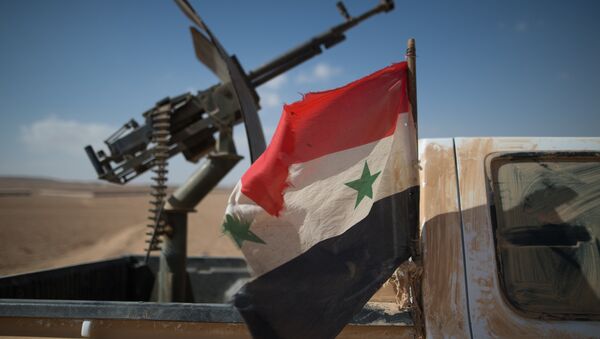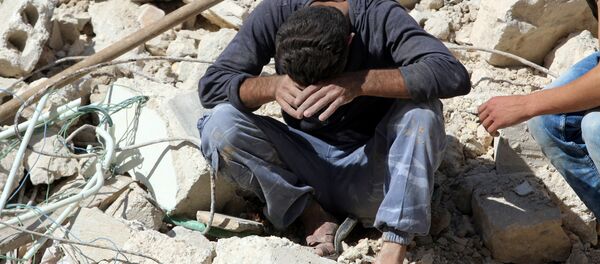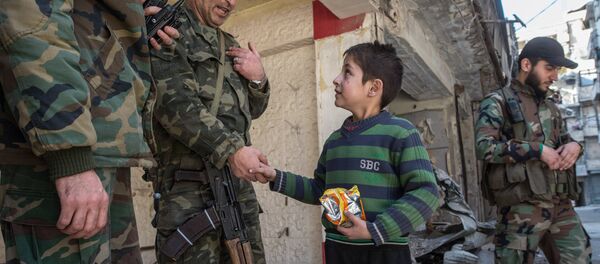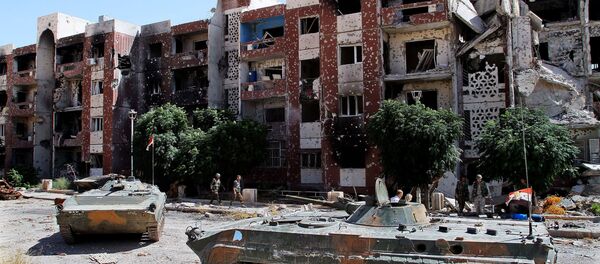ALEPPO (Sputnik) — The Syrian Army and security forces are using intermediaries to negotiate with rebel group commanders to facilitate the release of imprisoned civilians and soldiers in exchange for imprisoned terrorists.
With the help of Syrian security services, a RIA Novosti reporter has been able to meet in Aleppo with Hassan, a lieutenant in the Syrian Army, who was held in captivity by the rebels for one year. After being sentenced to death dozens of times, he was set free in late September in exchange for the release of a militant commander's wife.
A Warm Welcome
It was evening when the army truck arrived. A security service colonel for Aleppo was kind enough to send a driver to fetch the Russian reporter. Wondering around the city in the dark searching for the right address was unpleasant and dangerous.
After driving through the maze streets of Syria's largest city, the reporter arrived at an outpost near an unsightly building. The colonel and the lieutenant were already waiting.
“I knew that we would meet again. Last time the conversation was kind of unpleasant, so today’s occasion is much more to my liking. I’m happy that Lieutenant Hassan returned from captivity alive. Let’s talk this over in my office, where we can feel at ease, and I promise you a treat,” the apparently good humored colonel said as he shook my hand.
The last time we met with the colonel was several weeks ago during an interrogation of two rebel fighters from eastern Aleppo who decided to lay down their arms and surrender to the authorities. The colonel was grim, and there were no armchairs or sofas in the room, unlike the office of a local officer where we found ourselves after the handshake.
It is always hard to start a conversation until tea arrives. In keeping with the best oriental traditions, one is always asked whether one likes Aleppo, how cold it is in Russia and whether any kind of assistance is needed.
Then tea arrived, a strong and sweet brew served in small cups. The colonel handed out the cups on saucers to the guests.
Caught by Surprise
“It happened a couple of days before Idlib fell completely. Our detachment was in a residential district on the outskirts, just near a hospital. Several volunteer detachments were there too. The attack was sudden and full on. We fought back as best we could and started taking casualties. At one moment, a shell fell just next to me and I lost consciousness," the lieutenant said, sipping tea.
Local groups merged with al-Nusra Front and had a constant supply of fresh human resources crossing over from Turkey. Radicals had the Syrian-Turkish border under their control back then.
“I brought around my wounded comrade. The enemy had come in very close. We gathered what men we had left and took shelter in one of the houses. Civilians were still there too. The local volunteer forces retreated to the second line of defense. One apartment owner agreed to hide us. Everything went foggy in my head and I lay down under the bed and concealed myself with old rags. My comrade managed to jump into a cupboard," Hassan, the lieutenant, continued.
The lieutenant was most worried by the thought that the apartment owner might give them away, fearing reprisals. If they were discovered, they would be shot on the spot. The two soldiers did not linger for long. The old apartment owner was pale with fear. The soldiers asked only for some clothes to change into and left, so as to spare from danger the family that had sheltered them for a short time.
“We had to break through and get back to our own men on the second line of defense. We could already hear the terrorists’ shouts close by. We jumped down into the backyard. All was quiet there. We saw people in camouflage standing by a jeep that bore the emblem of one of the local militia groups. They stood tense, guns at the ready, as if ready to defend themselves on all sides. We approached them and it turned out that they were rebel fighters and they’d killed the militia fighter at the jeep’s wheel. I knew that this was the end," the lieutenant said, slapping his palm on the table and shaking his head.
According to Syrian soldiers, rebels decide on the spot who to take prisoner and who to shoot. Hassan’s lot was to be shot on the spot together with a few militia fighters and civilians accused of helping the government forces. Hassan recalled that his sentence was read out by a rebel who spoke like an Egyptian.
Little Choice
“I don’t know why, but they decided to spare me. They tied me up and took me toward the Turkish border. I don’t know where I was. At one point, the rebels put a sack over my head, tossed me like an animal into the back of a pickup truck, and kicked me the whole way," Hassan recalled.
He was taken to an improvised prison and interrogations began. Upon learning that he was a Sunni and came from Idlib, the rebels tried several times to persuade him to join them. When he refused, they called him a traitor and beat him, threatening him with execution.
The lieutenant came around after the interrogation to find himself in a small, dark and completely empty room. He spent 10 days without any daylight. There were no further beatings or interrogations. A little food was tossed into the room from time to time through the door.
“On the tenth day, I heard a voice. It was that same Egyptian who read out the sentence. He said that no one was looking for me and my commanders couldn't care less about my fate. My choice was therefore simple – either I join their side, or face execution in a few hours’ time”, he said with fear in his eyes.
The colonel laid a hand on his shoulder and another soldier poured tea.
The Syrian Roulette
After a while, the foreigner led the lieutenant to a corridor that reminded him of a secondary school. In his calm way, the recruiter started telling Hassan about jihad, religion and Sharia law.
“They were emphasizing that I was a Sunni Muslim and therefore not needed in the army. But they don't have to tell me about my religion or my superiors. I pray and fast and live the Islamic way. What they are doing is not Islam, it’s terrorism. So I told him I won't listen to him. Then I was confined to the dark room again. And I began waiting to be executed,” the officer said, his lips trembling.
A few hours later, Hassan was led to a sports ground, where two blindfolded young men were already kneeling. He was forced to sit down next to them and a blindfold was put on his eyes. A minute of silence and the militants fired a few bursts from their automatic rifles.
“At that moment I thought I was dead, but the next minute I heard them laugh out loud. They tore off my blindfold and I saw a dead body lying between me and the other prisoner. I was paralyzed with shivers. These selective executions went on for several months, occasionally several days at a stretch. But sometimes they paused for a day or two. Each time they killed one man and took all others back. At some moment I looked at it with absolute calm without hysterics or fear. I caught myself thinking that I’d better die,” he finished his story looking at the colonel.
The colonel said that he had heard a lot of similar accounts. According to his information, the militants were breaking prisoners psychologically to execute survivors on-camera. “Did you notice the calm faces of the prisoners in orange shirts before executions? Would an ordinary man be so calm knowing he is going to die?” the colonel summed up knowingly.
Slavery in Aleppo
After four months, Hassan and several other prisoners were taken to a place near Aleppo where the battle for the city was raging. Terrorists made their captives build defense lines and dig trenches right along the frontline. This shielded rebel fighters from snipers. Day in and day out, prisoners worked on the frontline during the day, and were taken behind the lines for the night.
At the same time, fighters wishing to return to civilian life are offered an opportunity to head to Idlib with small arms as part of a state program for national reconciliation. In this way, hundreds of fighters were transported from Damascus suburbs and Homs to Idlib. Local rebel leaders tend to view the new arrivals as reserves and send them back to the Aleppo and Hama fronts.
Officer for a Terrorist's Wife
“We have learned from our sources that several military officers are kept in one of the villages. We found intermediaries and started to negotiate a prisoner exchange,” the colonel explained.
Sitting in his cozy office, he told us that a plethora of services were involved when it came to searching for prisoners and freeing them. The main objective is to have prisoner exchange lists featuring Alawites, Christians and Sunni Muslims. Government officials, NGOs and regular citizens often say that inter-faith strife was imposed on Syria artificially. Before the crisis broke out in Syria, it was considered inappropriate to inquire a person about his or her creed and this was deemed irrelevant.
“We knew that our officer was held by the Harakat Nour al-Din al-Zenki group in an area where we planned to advance our troops. When forced to retreat, terrorists tend to kill prisoners, especially those with a military background. We had little time, and needed to take prompt action,” the colonel went on to say.
The solution came out of nowhere. An intermediary informed security officers that the rebel leader in charge of the area where the captives were located was ready to set them free in exchange for his wife.
“This was a challenging request. The woman was serving a prison term for terrorism and had already spent three years in jail. However, we decided that there was no time for protracted discussions, and agreed. She was taken to Idlib, and our two officers, including Hassan, were freed and alive,” the colonel said, once again tapping the shoulder of the lieutenant.
Hassan has a lengthy treatment and rehabilitation process ahead of him. Still, he is committed to joining the army ranks once again.
What the lieutenant wants is to continue fighting not just for liberating Syria from terrorists, but also for the purity of his faith that preaches peace, not war.







